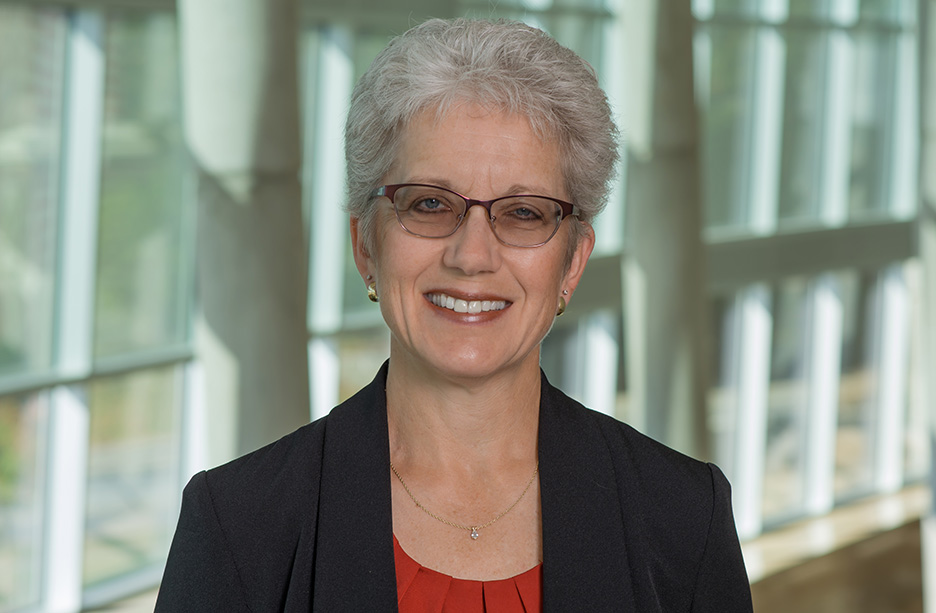About CRISP
This University of Nebraska Board of Regents center was approved March 18, 2016, and was renewed in 2021. The Center is administered within the College of Nursing on the University of Nebraska Medical Center Omaha campus.
The five CRISP Cores:
- Research & Scholarship,
- Industry & Innovation,
- Community Engagement & Scholarship
- Postdoctoral & Mentorship and
- Qualitative Methods Lab
Goals
- Expand research resources to support self-management research in chronic conditions.
- Expand the number of interdisciplinary externally funded studies focused on self-management of chronic conditions.
- Develop scientists at UNMC and the University of Nebraska systems to support the discovery, dissemination, and implementation of evidence-based self-management strategies in the community and clinical practice.
- Support the use of technology for studies of self-management of chronic conditions in a variety of settings.
- Provide the infrastructure and home for postdoctoral scholars and graduate students in nursing to be involved in interdisciplinary team science in self-management and prevention of chronic conditions.
- Plan for and develop sustainability of the center through building research, dissemination, and implementation initiatives in collaboration with university, community, and clinical partners.
Membership
All University of Nebraska colleagues, postdoctoral fellows and graduate students with a research focus on chronic illness prevention & self-management are welcome to become CRISP members. Membership provides opportunities to network, share information, collaborate on funding opportunities, research, and publications.
Benefits:
- Eligibility for CRISP Just-in-Time funding
- Access to CRISP seminars, educational events, and professional development opportunities
- Access to expertise in engaging with industry and developing interventions.
- Access to expertise in qualitative methodology.
- Engagement with collaborators on multidisciplinary manuscripts and grant opportunities.
- Regular updates on chronic care prevention and self-management research, events and funding opportunities through the CRISP newsletter
- Access to manuscript editing, and additional future services.
Members enjoy discounts when fees apply.
Expectations:
- Collaborate with CRISP colleagues and develop scholarly teams for research productivity.
- Identify opportunities to mentor CRISP post docs and early career investigators to promote scholarship around the science of prevention and self-management of chronic illness.
- Cite CRISP funding and services used in presentations and publications.
- Help us track the scholarly productivity of our members by completing annual survey.
- Tell us your needs and help us identify opportunities.
History of CRISP
The UNMC College of Nursing developed an Interdisciplinary Healthy Heart Center: Linking Rural Populations by Technology after receiving a Developmental Center Grant from the National Institutes of Health, National Institute for Nursing Research. The purpose of the center was to enhance and expand the infrastructure within the College of Nursing necessary to conduct interdisciplinary health promotion/disease prevention for cardiovascular research in rural settings using technology.
The Center focused on innovative research to disseminate and diffuse research findings through UNMC’s premier educational programs and extraordinary patient care programs. Faculty and graduate students were supported in developing their research and career trajectories, through studying self-management of chronic conditions in individuals, caregivers, families and at-risk populations across a variety of settings in the community.
The University of Nebraska Board of Regents approved plans to establish the Center for Patient, Family, and Community Engagement in Chronic Care Management (CENTRIC) with a continued focus on facilitating innovative research to disseminate and diffuse research findings through UNMC’s premier educational programs and extraordinary patient care programs. CENTRIC is a multidisciplinary center administered within the College of Nursing on the Omaha campus of UNMC.
At this time, chronic illnesses and conditions are a growing crisis. An estimated 133 million United States adults have a chronic diseases and nearly 25% of those have two or more chronic diseases. To address the problem, the Center worked to support research through funding and mentorship to engage to develop innovative programs to support patients, family caregivers, and community partners in self-management of these conditions. Multidisciplinary teams of CENTRIC implement strategies to promote research and scholarship on self-management to maintain and improve patient’s health and prevent a decline in health. Self-management support programs are one means of improving patient outcomes and reducing hospital readmissions and emergency room visits.
The Board of Regents approved CENTRIC's name change to:
CRISP - Center for Chronic Illness Self-management and Prevention

Robin Lally, PhD, MS, BA, RN, AOCN, FAAN
Director, Center for Patient, Family & Community Engagement in Chronic Care Management Bertha L. Pankratz Professorship in Nursing
Professor, UNMC College of Nursing